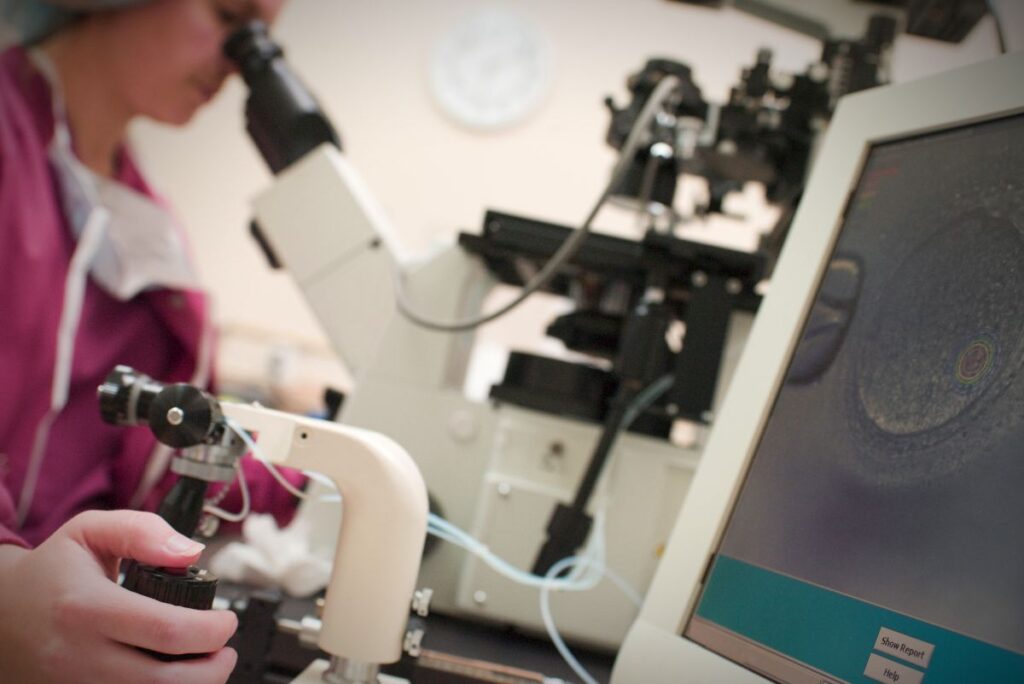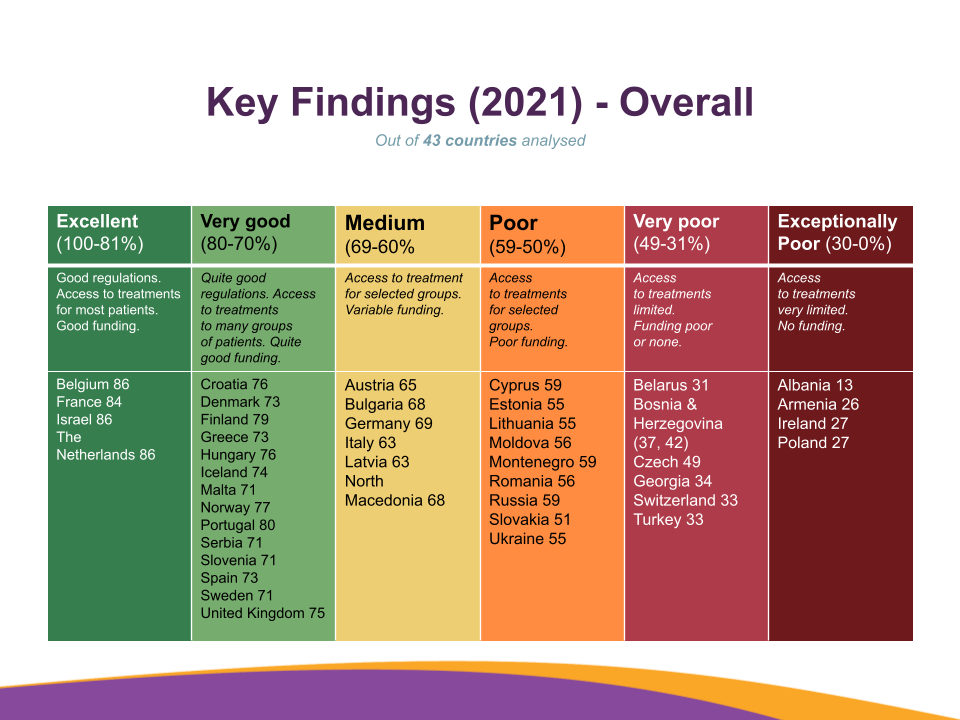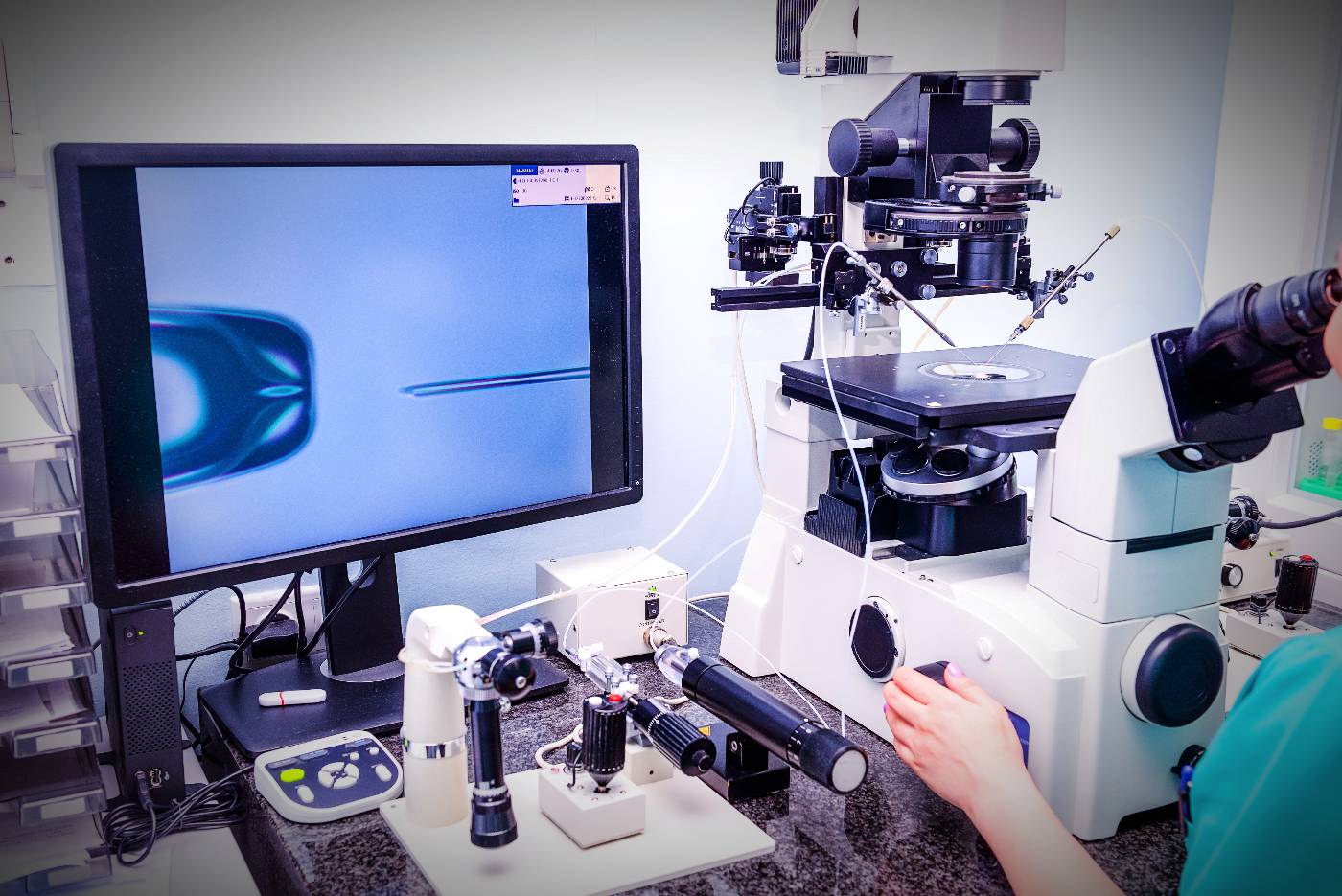The history behind IVF
Oldham, England, July 1978 a baby was born. It was an ordinary baby but at the same time, it was unique. Her name was Louise Brown and she was the first-ever baby to be born using In vitro fertilization. All the eyes in the world were on Louise and the pioneers behind the IVF success, Robert Edwards and Patrick Steptoe. The controversies around in vitro are still present, we can easily imagine it was even more controversial then. It took 102 tries of IVF treatments to reach success in the form of the first pregnancy. Today IVF is the most essential tool in treating various cases of infertility. In 2010 Robert Edwards was awarded the Nobel Prize in Medicine for the development of in vitro fertilization.
Later when the embryo or embryos form they are transferred to the uterus. It may sound simple but 30 years ago it really was a complicated and expensive treatment, nowadays it is more of a standard procedure.
Since 1981 IVF and similar procedures resulted in more than 5 million babies.
What is IVF treatment?
IVF is an assisted reproduction technique that involves oocyte fertilisation by sperm sample in the in vitro laboratory.
The IVF treatment begins with hormone therapy (ovarian stimulation) which has the job of stimulating the development of several follicles in the ovary. Later several embryos are created by collecting the eggs (follicles) and fertilising them in a test tube – at the IVF laboratory. The embryos are kept in an incubator for 2 to 5 days and then 1 or 2 of the embryos are transferred to the uterus through the vagina. Then the implantation in the uterus begins as well as the pregnancy.
Of course like in a natural conception, not every embryo that was implanted becomes a pregnancy. That is why all the additional embryos are being frozen which now is a standard procedure for most IVF clinics worldwide. In case the first implantation fails then the frozen embryo could be used for another try.
When can IVF help?
It should be clear that when dealing with infertility IVF is not the first step in this struggle. There are things that should be done first in order to know if IVF is really needed. If fertility drugs, artificial insemination and surgery did not work this is the right time you should try IVF.
IVF is a good option for couples or people who failed to get pregnant using other infertility treatments. Often women who have problems with fallopian tubes which are either blocked or absent undergo IVF treatments, after all this is the main reason IVF was invented. During IVF procedures the fallopian tubes are entirely bypassed so it ceases to be an issue.
IVF treatment is also a good option for women who suffer other infertility problems like polycystic ovary syndrome (PCOS) or endometriosis. PCOS is caused by hormone imbalance which includes symptoms like irregular, heavy or no menstrual periods at all, pelvic pains and makes getting pregnant very difficult. Endometriosis on the other hand causes infertility because the tissue that should grow inside the uterus, grows outside the uterus instead.
Women which suffer from menstrual cycle abnormalities can also benefit from using IVF thanks to fertility drugs which will help to generate healthy eggs. Furthermore, if a woman cannot produce healthy eggs she can use donated eggs. If the problem is male infertility again IVF treatment with ICSI (intracytoplasmic sperm injection) can overcome this obstacle – and there are other techniques that may help with a male-factor used in the IVF laboratory e.g. IMSI, PICSI, MACS and others. You need just one healthy sperm sample in order to fertilize the egg so IVF is very much preferred by men with low sperm count or low-quality sperm.
So in which cases could IVF help?
- A woman has blocked fallopian tubes. If you have blocked or damaged fallopian tubes IVF gives you the opportunity to get pregnant with a child with your own eggs.
- You are older and have a low ovarian reserve. In this case, IVF raises the older patient’s chances of conceiving. If you are too old and you can’t produce your own eggs or they are of low quality you can use IVF with egg donation.
- Your male partner has infertility. You will have a much higher chance of conceiving with IVF. Using ICSI (intra-cytoplasmic sperm injection) solves the problem of low sperm count.
- You have endometriosis. IVF has proved to be successful among women with endometriosis even in some severe cases of this disease.
- You have Polycystic ovary syndrome. This condition causes hormone imbalance which leads to irregular menstrual cycles. IVF can help with this condition in patients who do not respond well to fertility medication.
- You have premature ovarian failure. In case of premature ovarian failure or menopause a patient can use donor eggs to have a high success rate with IVF.
- You have unexplained infertility. Sometimes couples struggle with infertility which could not be diagnosed. However, even in such cases couples that tried IVF were often successful.
Can IVF always help?
Unfortunately in vitro fertilization cannot help every couple that dreams of a child. If a woman does not produce healthy eggs and refuses to use donated eggs she will not have a big chance for success.
Another issue is of course ageing. When a woman approaches the age of 40 the egg production slows down. If a woman is older than 37 years she already has a smaller chance of getting pregnant using IVF treatments. If a woman is closing into her 40s it would be a good idea to use donor eggs to boost the chances for conceiving. Using IVF with donor eggs makes the chances of getting pregnant similar for all the age groups but after the age of 40 women are more likely to miscarry.
There are also some conditions that could have a significant impact on the effectiveness of the IVF treatment:
- Ovarian and uterine dysfunctions and abnormalities;
- Fibroid tumors;
- Abnormalities in hormone levels.
- Genetic abnormalities related to oocytes, sperm and embryos
Women suffering from such conditions may have fewer chances of getting pregnant using IVF treatment.
Advantages of IVF with ICSI
Very often when people think of infertility they immediately think of its relation to women. However, a lot of infertility derives from men. Intracytoplasmic Sperm Injection (ICSI) has become a great tool for clinicians to fight male infertility. Furthermore even in cases of female infertility pregnancy rates of IVF with ICSI are as high or higher than in a standard IVF procedure.
If you’re thinking of doing IVF with ICSI it is very important you consider various advantages and disadvantages which this procedure involves.
Intracytoplasmic Sperm Injection gives you and your partner an opportunity to have a child even in cases of severe male infertility. Using ICSI can help you get pregnant even if more than one issues of infertility occur:
- Low sperm count
- Past IVFs without success
- Physical blockage
- Morphology or motility of the sperm is of poor quality
- If you underwent vasectomy in the past
IVF success rates
The success rate of IVF declines gradually after the women reach the age of 35.
IVF success rate is a very individual factor depending on many factors (infertility diagnosis, age, BMI, previous treatment history, genetic diagnosis and many others…). As an example – according to ESHRE 2017 EIM report (for popular European countries) – IVF with own eggs success rates:
- for women below 34 years old range from 25.4% to 30.5%
- for women between 35-39 years old range from 20.2 to 25.9
- for women over 40 years old range from 8.9% to 14.3%
IVF success rates for donor egg replacement – egg donation success rates are age-independent and as per ESHRE 2017 EIM report – egg donation outcomes:
- Fresh embryo transfers range from 34.4% to 61.6%
- Frozen embryo transfers (thawed embryos) range from 23.1 to 62.2
You should treat the numbers above as examples of IVF success rates in Europe. The ESHRE reports are very detailed and you can gather various information from them e.g. IVF success rates per country (Europe), per age, per different techniques used, per number of embryos transferred and many more. You may also find another example in reports from ASRM and CDC’s Fertility Clinic Success Rates Report in the USA. As well as the ESHRE in Europe and ASRM in the USA, the HFEA publish national IVF success rates data for the UK.
And if you’re interested to see the IVF success rates prediction based on cases similar to your situation you may be interested in trying the IVF success rate calculator published by SART (Society for Assisted Reproductive Technology) in the USA.
As you can see IVF success rates are different as per country and woman age – and this is one of the reasons you as a patient should expect a personalized prognosis (in terms of the IVF outcome) from the IVF clinic based on your individual case and circumstances.
Risks and complications of IVF
Like every medical procedure, IVF has its own risks, complications, and side effects. Some of them or more or less dangerous. However, complications in both medicine and procedure are very rare.
Medication-related complications
The most dangerous complication connected to IVF medication is Ovarian hyperstimulation syndrome (OHSS). Most of the symptoms of OHSS like nausea, ovarian discomfort, bloating are rather mild but in some cases can cause serious complications. Severe cases of OHSS could lead to large amounts of fluid building up in the abdomen and lungs. In very rare cases OHSS can lead to kidney failure and blood clots.
Other possible side effects of using IVF medications is nausea and sometimes vomiting, some allergic reactions, sore breasts, fatigue and mood swings.
In the past, there were some suggestions about the link between medication and ovarian cancer but the latest studies show that there is no evidence showing this is true.
Multiple pregnancy and births
One of the most common side effects attributed to IVF treatments is multiple pregnancies. Transferring two or more embryos could cause multiple pregnancies. However, some people would prefer to have two kids right away most of them want just one child and that is why Single Embryo Transfer is more popular and recommended by national regulators of IVF in countries worldwide. As well as in other countries the UK fertility regulator – HFEA – Human Fertilisation and Embryology Authority recommend a single embryo transfer. The rest of the embryos can be frozen so they can be used if the first transfer is not a successful pregnancy.
Miscarriage and Ectopic Pregnancy
Like in a natural pregnancy there is a chance of miscarriage. The rate of miscarriage is similar to this in a natural pregnancy. For women in their 20’s the chance for miscarriage is about 12-15%. Both in natural and IVF pregnancy those chances rise with the age of the mother. Women at the age of 40 and more can have a chance of miscarriage as high as 50% or even more.
Ectopic Pregnancy is when the embryo implants in the fallopian tube instead of in the uterus. It is a very rare occurrence in IVF treatments. However, it could be a very serious and dangerous medical emergency. It must be dealt with very quickly to avoid serious health issues or sometimes even death. If during pregnancy you feel sharp pains, vaginal bleeding, low back pains, dizziness or low blood pressure you need to contact your doctor right away.
Egg retrieval complications
During and or after egg retrieval you can mostly feel some mild discomfort. However, in some very rare cases, excessive bleeding might occur from the ovaries or from the organs close to the ovaries which have been injured, like the bladder, blood vessels or the bowel. If the bleeding is massive surgery or blood transfusion might be necessary. Also, you should be aware of the risk of pelvic infections, especially if you already had such infections in the past but this is again also very rare.
Birth defects
Chances for birth defects in IVF children or only slightly higher than in children conceived naturally. Naturally, it’s about 2 to 3% and through IVF it’s about 2,6 to 3,9%.
As you can see the chances are almost the same.
To sum up, IVF treatments are safe and the risks that may occur should not stop you from trying to have a child. You may be interested in reading about Risks And Complications Concerning IVF With Egg Donation.
General IVF treatment options
IVF gives you a wide range of different treatment options. Each has its own advantages and disadvantages and should be used depending on the clinical status of the patient.
Below you will find a short description of some of the IVF treatment options which can be used in treating infertility.
IVF with own eggs
In Vitro Fertilisation with your own eggs is a laboratory method consisting of fertilising previously collected eggs with your partner’s or donor’s sperm. When the egg is fertilised, the egg develops into a pre-embryo and is transferred to the uterus so it can continue to develop.
If your eggs are healthy but your partner’s sperm is of low quality or your fallopian tubes are damaged or blocked this is the treatment for you. It is also a good option for couples which tried artificial insemination several times without success.
Natural IVF cycle
In the natural cycle of IVF during your normal monthly cycle, the egg is collected and fertilised without the usage of fertility drugs.
If your ovulation and periods are fairly normal you may talk about this option with your clinician. No hyperstimulating drugs are used during the natural cycle so there is no chance of ovarian hyperstimulation syndrome (OHSS) and all other problems related to ovarian stimulation like bloating and mood changes. It is also a good option if your religious or personal beliefs disagree with storing or destroying the surplus of eggs or embryos.
So it is like a standard IVF procedure but without the stimulating fertility drugs and also if the treatment fails you do not have to wait a long time but just to the next cycle to try again.
The lack of any artificial aids has however a major drawback and it is the success rate. The success rates in a natural cycle IVF are significantly lower than in the standard stimulated IVF.
Mild stimulation IVF
As in the options above the mild stimulation IVF also expects fewer fertility drugs to be used.
According to Esther B Baart “Mild ovarian stimulation is defined as the administration of fixed, low doses of gonadotrophins in GnRH antagonist cycles and/or the use of anti-estrogens or aromatase inhibitors with the aim of limiting the outcome to no more than eight oocytes retrieved.”
- Mild stimulation IVF may be suggested for patients whose reaction to fertility drugs could be too dangerous.
- It is very similar with the standard IVF treatments with some slight differences.
- There is a smaller amount of fertility drugs used and in a shorter period of time
- The amount of fertility drugs taken does not interfere with your natural cycle and this way shortens the drug usage for about two weeks and helps avoiding menopausal side-effects.
- The lesser amount of drugs may cause smaller amount of eggs to be collected
- You do not have to wait a long time for another try in case of failure
- There is no real data about the success rates of Mild stimulation IVF as different protocols are used for various patients depending on individual situation
The combination of mild stimulation protocols with elective single embryo transfer (eSET) may provide the same delivery rate per treatment cycle by reducing the negative aspects of a more aggressive stimulation.
SOURCE: Best practices of ASRM and ESHRE: a journey through reproductive medicine
Human Reproduction, Volume 27, Issue 12, December 2012, Pages 3365–3379
IVF with donor eggs
Egg donation (or oocyte donation) gives the possibility for pregnancy for women who cannot get pregnant using their own eggs either because they cannot produce eggs or the produced eggs are of low quality. The eggs can be donated by a healthy donor. The clinicians fertilize the eggs in a laboratory and transfer the created embryos into the woman’s uterus.
If a child is born from egg donation the recipient is not biologically related to the child but she will be the birth mother on record.
Sperm donation
A sperm donor donates his sperm which purpose is to inseminate a woman with who he has no sexual relationship. The donation is carried out privately and directly to the recipient or either through a sperm bank or a fertility clinic. Most of the women choose artificial insemination with the donor sperm but some of them choose natural insemination because they believe that sexual intercourse rises their chances of becoming pregnant. The most common usage of donated sperm is among heterosexual couples struggling with male originated infertility or single woman.
IVF for single mother
Unlike other, in this section, this is not in any way a medical term but a sociological term. If a woman is widowed, unmarried or divorced and has a dependent child or children she is a single mother. Of course, it is the same way with men – single fathers. The term single parents is also in use of course but the great majority of single parents are single mothers.
Most of the single mothers are women that had a divorce or are separated. The second-largest group of single mothers are women which were not married. Then there is the group of single mothers who are widowed. Sometimes single women use donated sperm and become single mothers by choice.
IVF for same-sex parents
It is also a sociological term. Same-sex parents are obviously couples of the same sex who decide to have a baby together. Either it is a couple of males or a couple of females they have now different options of becoming parents. A same-sex couple can adopt a child, use a surrogate or if it is a female couple one of the partners can get pregnant using donated sperm.
Of course, same-sex parents is still a controversial subject. In most countries, same-sex marriage is still banned.
IVF and sex selection
Sex selection using IVF techniques is a very controversial subject. It involves controlling the sex of a child to be born to achieve the desired gender. The term which is also in function is family balancing which is used when a couple already has a child of one sex and would want another child of the opposite sex and in this way achieve a ‘full family’. This procedure is controversial because very often it is not used for family balancing but because of a son preference. In countries like China, India or Pakistan sex selection severely distorts the sex ratio of children. Parents choosing boys over girls for economic, cultural or religious reasons in those countries will have a very bad influence on these countries demographics.
According to country national associations and international associations, the preimplantation genetics diagnosis should only be used to prevent the transmission of serious genetic disease and should be discouraged in any “family balancing” scenarios.
Surrogacy
Surrogacy is an arrangement between a couple or in some cases a single person and a woman who agrees to be the carrier of the pregnancy for the couple. Surrogacy is an option if you cannot carry a child yourself because of a medical condition or if the pregnancy and giving birth could put your health in danger.
The embryo is created using the eggs and sperm of the intended parents or donated eggs and donated sperm or mixed.
There is also a different kind of surrogacy called partial surrogacy in which the creation of the embryo involves the sperm of the intended parent and eggs of the surrogate.
When IVF fails, what next?
Most of the patients believe that the first IVF cycle will be the one… However, statistically, according to data published by Centers of Disease Control and Prevention on average there are around 3 IVF cycles per live birth – for patients below 40.
So if you fail, don’t start thinking immediately about going for another try when IVF fails. Give yourself time. You have to understand that this treatment was a huge effort not only for your body but the mind. You need to take your time to recover. Those are not empty words! Experts say that giving yourself time and taking a break from the stress and fatigue can only help you and boost up your chances on the next try. First of all, you have to come to terms with the fact that your treatment failed and take a breath, spend time with your family and use their support.
The ability to predict chances of pregnancy and livebirth is critical to decision making around IVF. In cases where the outcome is in doubt, IVF itself is often seen as a prognostic exercise which is able to reveal which women are likely to respond to ovarian stimulation and produce good quality embryos. The ability to identify factors associated with failure at each stage of the treatment has the ability to refine decision making around proceeding with treatment – especially where the prognosis changes during treatment.
Source: Factors Associated with Failed Treatment: an Analysis of 121,744 Women Embarking on Their First IVF Cycles
5 must-dos after failed IVF
- Discuss previous treatment outcomes with the clinic team – trying to assess what went wrong
- Talk to your clinician and embryologist about your chances with the next IVF treatment
- Discuss different approach which could boost up your chances in future
- Discuss innovations in IVF – they might not be available at your clinic or country however professional doctor should share the information if any methods are available
- Talk to a counsellor about what you feel and what you really feel you want to do next.
…multiple failed cycles of IVF-ET are not associated with a diminished chance of success in a subsequent attempt…
Source: Impact of failed IVF attempts: a strong negative predictor of subsequent outcome.
Fertility and Sterility, VOLUME 76, ISSUE 3, SUPPLEMENT 1, S86-S87, SEPTEMBER 01, 2001

Do I need a psychological evaluation and consultation for IVF?
Before doing an IVF cycle it is very important to have a consultation with a counsellor specialized in third party reproduction. IVF is a process which of course gives incredible possibilities if you are having problems with conceiving a child. However, you need to remember that there is a whole bunch of different issues you will have to deal with. Very often they are issues that didn’t even slip your mind but it is so much better to come prepared than be caught off guard.
Even though you could think that if some of those issues weren’t mentioned you wouldn’t even worry about them but trust us, they will eventually find you and counselling will prepare you for it.
With the first session, the psychologist will evaluate your readiness to begin the treatment. He or she will take you through the whole IVF process step by step with all the psychosocial and emotional aspects that are connected to infertility.
Don’t forget to make an appointment with the counsellor after you choose your option of treatment and of course before you start with it. If you decide to use donor eggs your egg donor is also required to be psychologically evaluated, of course, physical health is not everything.
Legal aspects of IVF you should be aware of
In vitro fertilization can remind a maze when it comes to laws and regulations. Legal aspects of IVF are different from country to country and if you add religious and personal beliefs you have got yourself a minefield of legal issues. Even in a case where a woman uses her own eggs and sperm of her partner then still the creation of life outside the normal natural process raises controversies around the world.
How is IVF regulated?
All of the medical fields of practice are shaped by ethical and legal policies. However in the case of a fertility physician treating infertility those laws and regulations reach even higher than in any other medical area. Helping to create new life is a great responsibility.
The status of those legalities depend on the country and region where the patient undergoes treatment. Some of the countries have official legal policies and other work only under guidelines of some regulatory body. Also there are countries where there are no laws or regulations concerning the subject of IVF – very often in those countries the procedures of IVF or neither permitted neither prohibited. This very often means that the clinics are left to decide for themselves whether a procedure is available or not.
What kind of issues are regulated?
A lot of different procedures and additional treatments used in the assisted reproduction technologies can be permitted in one country and prohibited in another. Once you decided what other procedures you want to undergo in addition to the IVF you will need to go step by step through laws and guidelines of the specific country and check if the procedure is available there.
The policies go into play from the very beginning even when there has to be a decision made whether you can or cannot have IVF. In one country you might not get permitted to have IVF because you are too old but in another country the age limit might be higher and you will be able to undergo the treatment.
Another thing is your marital status. There are countries like China, Turkey or Indonesia where you need to be a married couple to have IVF. On the other hand more liberal countries like USA, Sweden or Spain allow IVF for single women and couples of the same sex. When it comes to IVF for homosexual couples most times female couples are considered parents. That is not the same with male homosexual couples. Male couples can be parents only in limited circumstances via surrogacy which makes the process very limited.
What is the best country for IVF treatment?
If you’re wondering if there are “better and worse” countries for an IVF treatment in terms of the “policies” – the Fertility Europe in conjunction with the European Parliamentary Forum for Sexual and Reproductive rights have launched the European Atlas of Fertility Treatment Policies. It’s comprehensive study of fertility policies across 43 European countries. As you can see on graphic below countries have been grouped by “policies quality”.

Sometimes, for various reasons, patients choose IVF treatment abroad. In this case, it is worth finding out about the legal conditions of treatment in a given country in the first place.
IVF regulations – important legal aspects
- Age of the woman
- Marital status: heterosexual couple, single woman, same sex female couple or same sex male couple
- Number of oocytes to fertilise: there might be restrictions in some countries in maximum number of oocytes for fertilisation
- Donor eggs and sperm: In some countries, like the UK, donors are not fully anonymous and that is why patients often travel to Spain where the donors are anonymous.
- Time for embryo development: In some countries only early embryos can be implanted and in others the embryos are allowed to develop for several days.
- PGT-A/PGS and PGD testing: Most countries allow PGD only for genetic diseases screening and some countries banned PGD completely.
- Amount of embryos transferred: More and more countries decide on only single embryo transfer but you can still find countries where you can do a multiple embryo transfer.
- Period of embryo freezing: Very often countries regulate the permissible time to keep the embryos frozen.
- Surrogacy options and the process
Further reading:




